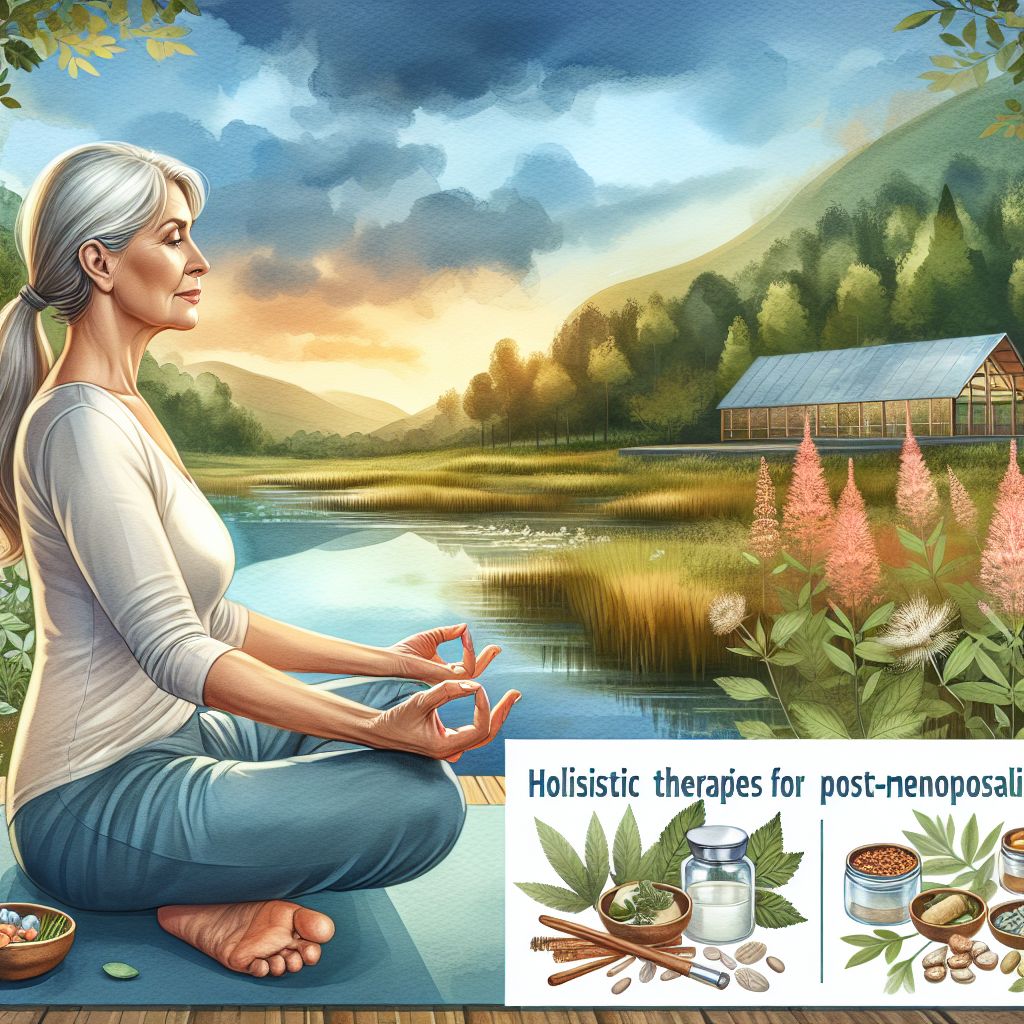Discover the vital role of holistic nutrition for post-menopausal anti-aging. In this guide, we explore how nourishing your body with holistic nutrition can promote vitality and well-being during this transformative stage of life. Unlock the secrets to aging gracefully with the insights and practical tips tailored specifically for women in post-menopause.
Key Takeaways
- Post-menopause, women’s nutritional needs shift, requiring a focus on specific nutrients for health and vitality.
- Whole foods rich in phytoestrogens, like flaxseed and soy, can help balance hormones naturally.
- Antioxidants and anti-inflammatory foods play a critical role in combating the signs of aging.
- Protein, calcium, and vitamin D are essential for maintaining muscle mass and bone health.
- Hydration is crucial for skin health and overall bodily functions, especially in post-menopausal women.
Why Holistic Nutrition Matters After Menopause
Menopause isn’t just a hormonal change; it’s a signal that your body’s needs are evolving. After menopause, you may notice that the same foods you’ve always eaten no longer serve you the same way. That’s because your metabolism, bone density, and muscle mass are all changing. To stay on top of these changes, it’s crucial to focus on holistic nutrition that supports your body’s new requirements.
Most importantly, a holistic approach isn’t just about what you eat; it’s about how your food choices integrate with other lifestyle factors to promote overall well-being. Therefore, we’re not just looking at diet alone, but at a comprehensive lifestyle that supports vibrant health during post-menopause and beyond.
Key Nutrients and What They Do
Let’s dive into the key nutrients that become even more critical after menopause:
- Calcium and Vitamin D: Essential for maintaining bone density and preventing osteoporosis.
- Protein: Supports muscle mass, which naturally declines with age.
- Omega-3 Fatty Acids: Help reduce inflammation and support heart and brain health.
- Phytoestrogens: Plant-based estrogens found in certain foods that can help balance hormones.
- Antioxidants: Protect your cells from damage and support your immune system.
By focusing on these nutrients, you can help manage menopausal symptoms and maintain your vitality for years to come.
Balancing Hormones with Whole Foods
One of the key challenges during and after menopause is managing hormone levels. While hormone replacement therapy (HRT) is an option for some, many women prefer to start with natural approaches, such as adjusting their diet. Whole foods can play a powerful role in balancing hormones.
- Eat more fiber-rich foods like fruits, vegetables, and whole grains to support digestion and hormonal balance.
- Incorporate healthy fats from sources like avocados, nuts, and seeds, which are vital for hormone production.
- Choose organic produce to reduce exposure to pesticides that can disrupt hormones.
By making these dietary changes, you can help smooth the transition through menopause and maintain hormone balance.
Eating for Estrogen: Phytoestrogens in Your Diet
After menopause, estrogen levels drop, which can lead to various symptoms. But certain foods contain phytoestrogens, a plant-based form of estrogen that can mimic the hormone’s effects in the body. Including these in your diet may help alleviate some menopausal symptoms.
Some of the best sources of phytoestrogens include:
- Flaxseeds
- Soybeans and soy products like tofu
- Garlic
- Sesame seeds
- Apricots
Remember, though, that the impact of phytoestrogens can vary from person to person. It’s about finding what works for you and your body.
Supporting Thyroid Health Post-Menopause
Your thyroid, the small gland at the base of your neck, has a big job: regulating your metabolism. Post-menopause, it’s common for thyroid issues to arise. But you can support your thyroid health by including certain nutrients in your diet, such as iodine, selenium, and zinc.
Foods that support thyroid health include:
- Seaweed, which is rich in iodine
- Brazil nuts, a great source of selenium
- Pumpkin seeds, which provide zinc
These nutrients help your thyroid gland produce the hormones that regulate your metabolism, energy levels, and overall well-being. For a deeper understanding of how diet can support your health during menopause, consider reading about integrative nutrition’s role in supporting menopause.
Building Strength and Wellness from Within
As we age, our bodies naturally begin to lose muscle mass and bone density. This is particularly true after menopause, making it imperative to focus on nutrients that build strength and wellness from within. A diet rich in specific nutrients can help counteract these natural processes and keep you feeling strong and vital.
Strength isn’t just about physical capacity; it’s also about the resilience of our bones, the flexibility of our joints, and the overall function of our bodies. By nourishing ourselves correctly, we can maintain our strength and wellness long after menopause has begun.
Protein: Your Muscle-Maintaining Powerhouse
Protein is the building block of muscle, and it’s essential for repairing and maintaining muscle tissue. After menopause, it becomes even more crucial to ensure you’re getting enough protein to combat age-related muscle loss, known as sarcopenia. Aim for a variety of protein sources to get a full range of essential amino acids.
For example, a breakfast of Greek yogurt with nuts and berries, a lunch of quinoa salad with chickpeas, and a dinner featuring grilled chicken or tofu can help distribute protein intake throughout the day.
Combining these sources with regular strength training exercises can help you maintain muscle mass and strength, which is vital for overall health and mobility.
Calcium and Vitamin D: The Duo for Bone Health
Calcium and vitamin D work together to protect your bones. Calcium is the key mineral found in your bones, while vitamin D helps your body effectively absorb calcium. Post-menopause, women are at a higher risk for osteoporosis, making these nutrients more important than ever.
Dairy products are well-known calcium sources, but if you’re lactose intolerant or vegan, you can turn to fortified plant milks, leafy greens, and almonds. Vitamin D can be trickier to get from food alone, so consider supplements if you don’t get enough sunlight or if your levels are low.
Smart Supplementation for Longevity
Even with a well-rounded diet, you might find gaps in your nutrition. That’s where supplements can play a valuable role. They can fill in the blanks and ensure you’re getting the full spectrum of nutrients your body needs for longevity and health.
But remember, supplements should complement, not replace, a healthy diet. Always talk to your healthcare provider before starting any new supplement regimen.
When Food Isn’t Enough: Choosing the Right Supplements
When selecting supplements, quality matters. Look for brands that have been third-party tested for purity and potency. Focus on supplements that address common post-menopausal concerns, such as bone density, heart health, and hormonal balance.
Some key supplements to consider include:
- Calcium and vitamin D for bone health
- Magnesium for muscle function and sleep quality
- Omega-3 fatty acids for heart health and cognitive function
The Role of Omega-3s in Aging Gracefully
Omega-3 fatty acids are well known for their anti-inflammatory properties and their role in heart and brain health. These healthy fats can also support skin health, keeping it supple and reducing the appearance of wrinkles. Foods high in omega-3s include fatty fish like salmon, flaxseeds, and walnuts.
If you don’t regularly consume these foods, an omega-3 supplement could be beneficial. Look for high-quality fish oil or algae-based supplements if you’re vegetarian or vegan.
Staying Hydrated: The Overlooked Anti-Aging Secret
Hydration is crucial for all bodily functions, and its importance only grows as we age. Water helps to keep our skin plump and elastic, aids in digestion, and ensures our organs function optimally. As we get older, we might not feel thirsty as often, which makes it easy to become dehydrated.
Therefore, it’s essential to make a conscious effort to drink fluids throughout the day. Besides that, eating water-rich foods like cucumbers, oranges, and melons can help you stay hydrated.
Hydration and Skin Health
Proper hydration can lead to visible improvements in skin health. Dehydrated skin can appear more wrinkled and dry, so maintaining adequate water intake can help your skin look its best. This doesn’t mean you need to overdo it; drinking to thirst and ensuring your urine is light yellow is a good rule of thumb.
How Much Water Do You Really Need?
The amount of water you need can vary based on your body size, activity level, and climate. A general guideline is to aim for at least 8 cups (64 ounces) of water a day, but you may need more if you’re active or live in a hot environment.
- Start your day with a glass of water to kickstart hydration.
- Carry a reusable water bottle with you to sip throughout the day.
- Include herbal teas and other non-caffeinated beverages as part of your fluid intake.
By staying hydrated, you support your body’s natural anti-aging processes and overall health.
Creating an Age-Defying Kitchen
Now that we’ve covered the key nutrients and their importance for post-menopausal health, let’s turn to practical tips for creating an age-defying kitchen. This means stocking up on foods that support your nutritional needs and developing meal plans that make it easy to incorporate these foods into your daily life.
Staple Ingredients for an Anti-Aging Diet
Transforming your kitchen starts with the basics. Here’s what you’ll want to have on hand: For a deeper understanding, consider exploring this comprehensive guide on an Anti-Ageing Diet.
- Leafy greens like spinach and kale for vitamins and minerals
- Berries and other fruits for antioxidants
- Nuts and seeds for healthy fats and protein
- Whole grains for fiber and energy
- Lean proteins like chicken, fish, or plant-based alternatives
With these ingredients, you can mix and match to create meals that are not only delicious but also packed with anti-aging benefits.
Meal Planning for Holistic Health
Meal planning can seem daunting, but it’s a powerful tool for ensuring you get the right nutrients every day. Start by planning out a few days at a time, including all meals and snacks. Make sure each meal includes a good source of protein, healthy fats, and plenty of fruits and vegetables.
For example, a day might include oatmeal with berries and nuts for breakfast, a quinoa and roasted vegetable salad for lunch, and grilled salmon with a side of steamed broccoli and sweet potato for dinner. Snacks could be Greek yogurt or a handful of almonds with an apple.
FAQs
What are phytoestrogens, and how do they help post-menopausal women?
Phytoestrogens are natural compounds found in certain plants that can mimic the hormone estrogen in the body. They can be particularly helpful for post-menopausal women who are experiencing a drop in their natural estrogen levels.
By incorporating foods high in phytoestrogens, such as flaxseeds, soy products, and certain fruits and vegetables, women may experience reduced symptoms like hot flashes and improve their overall hormonal balance.
Are there any natural thyroid supporters I should include in my diet?
Yes, certain nutrients are known to support thyroid function, which can be especially important post-menopause as the risk of thyroid issues increases. These nutrients include iodine, selenium, and zinc.
- Iodine can be found in seaweed and dairy products.
- Selenium is abundant in Brazil nuts and sunflower seeds.
- Zinc can be sourced from pumpkin seeds and chickpeas.
Including these foods in your diet can help support thyroid health and overall metabolism.
How can antioxidants prevent signs of aging?
Antioxidants are compounds that help neutralize free radicals, which are unstable molecules that can damage cells and contribute to aging and diseases. By consuming antioxidant-rich foods, you can protect your cells from damage and slow down the aging process.
Foods high in antioxidants include berries, dark chocolate, nuts, and green tea. Regularly incorporating these foods into your diet can help maintain youthful skin, a sharp mind, and a healthy body.
What types of protein are most beneficial for maintaining muscle mass?
For maintaining muscle mass, it’s important to consume complete proteins that contain all the essential amino acids your body needs. Animal proteins like chicken, fish, and eggs are complete proteins, but if you’re vegetarian or vegan, you can combine different plant-based proteins to ensure you’re getting a complete profile.
Examples of plant-based protein combinations include rice and beans, hummus with whole grain bread, and peanut butter on whole grain toast.
Can diet alone provide all the necessary post-menopausal nutrients?
While a well-rounded diet is the foundation for good health, some women may find it challenging to get all the necessary nutrients from food alone post-menopause. Factors like dietary restrictions, food intolerances, and specific health conditions can create gaps in nutrition.
In these cases, supplements can be beneficial. It’s best to consult with a healthcare provider to determine if supplements are right for you and which ones to include.
Why is hydration so essential for anti-aging?
Hydration is crucial because water is involved in many bodily functions, including maintaining skin elasticity and flushing out toxins. Adequate hydration can help keep your skin looking plump and reduce the appearance of fine lines and wrinkles.
Moreover, staying hydrated helps with digestion, circulation, and nutrient absorption, all of which are important for overall health and preventing the signs of aging.
What does a weekly meal plan for post-menopausal health look like?
A weekly meal plan for post-menopausal health should include a variety of nutrient-dense foods to support hormonal balance, bone health, and muscle maintenance. Each day should feature a balance of lean proteins, healthy fats, and plenty of fruits and vegetables.
For example, breakfasts might rotate between smoothies, oatmeal, and eggs with vegetables. Lunches could include salads with lean protein, and dinners might feature a mix of fish or poultry with whole grains and steamed vegetables. Snacks should be simple and nutritious, like nuts, yogurt, or fruit.



